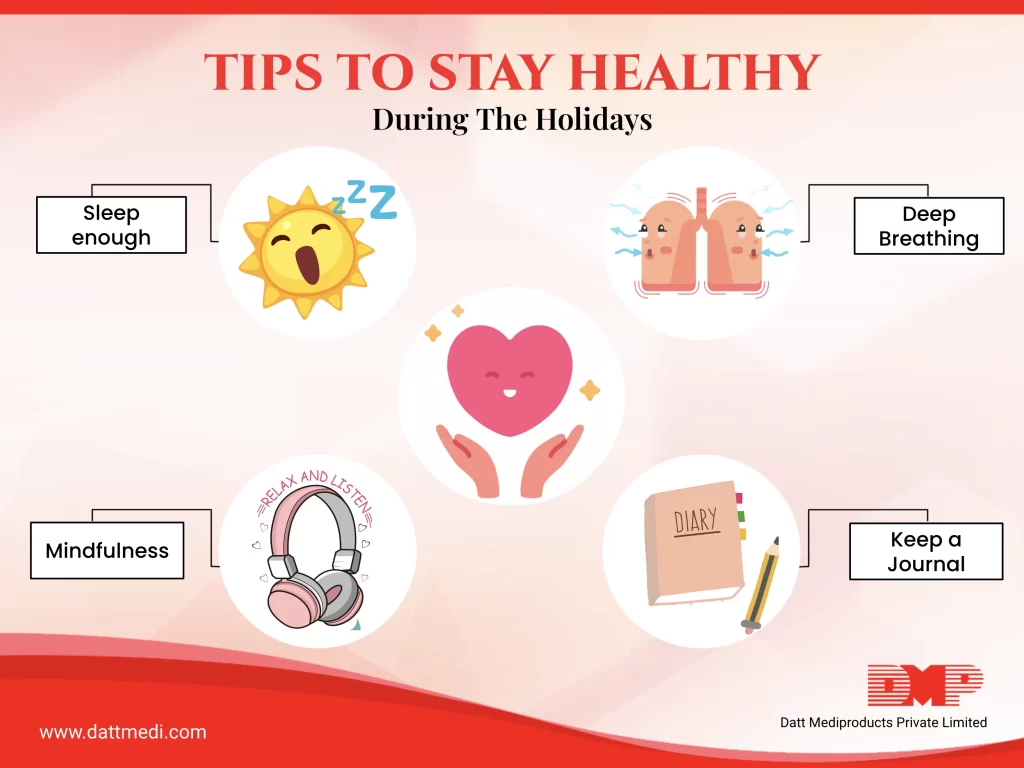
Holidays might be a good time for our taste buds but not for our waistline. Holidays are often associated with stress, anxiety, and overeating.
We bring a compilation of some simple yet effective health tips you can follow to make it the best holiday season you have spent.
PERSONAL CARE:
The holiday is a time of extreme fun, madness, and celebrations. Don’t let this take a toll on your mental and physical health. Take care of yourself. Spare some Me-time for yourself. Don’t put your needs on the back burner. Do things that truly make you happy, whether it’s reading a book, cooking, going on a walk, meditation, or doing some art & craft. Take some time to relax in between your hectic holiday arrangements and clear your mind. Pamper yourself with a good massage or spa date, just a few moments to recharge and unwind.
SLEEP ENOUGH:
Get the recommended 7-9 hours of sound sleep. Insufficient sleep can alter your hormones, thereby increasing your cravings for less healthy food and encouraging weight gain. In addition, tiredness causes exhaustion, thereby increasing your stress levels, which again could lead to weight gain.
STICK TO A HEALTHY DIET:
Everyone craves delicious holiday foods, but not all of them are healthy. Treat yourself, but keep an eye on your health and how certain foods affect you. Count your calories, watch the carbs, and drink alcohol in moderation. Don’t get carried away by the holiday spirit. Take better control of your food choices, debunk the hype of overrated holiday foods.
AVOID OVEREATING & WATCH OUT FOR FOOD POISONING:
Eat your holiday foods in modest quantities to avoid any gastric troubles and digestive issues. it’s not necessary to over-stuff your belly. Recognize that you can eat these another time also. Eat slowly and look for satiety signals from the brain. Eat more veggies and drink plenty of water to ease your digestion.
STAY HYDRATED:
Water makes a major percentage of our body’s total weight. This needs to be maintained for the body to function properly such as while delivering the nutrients to various cells & tissues, maintaining cell fluids, etc. Having an alternate glass of water with other alcoholic drinks/ cocktails is a healthier option.
PROBIOTICS FOR IMMUNITY
If you don’t take probiotics, the holidays might be a good time to start. The probiotic bacteria “Bifidobacterium bifidum” boost immunity against the common cold and flu during times of acute stress.
CHOOSE HERBAL TEA OVER COFFEE:
If you want a warm cup of coffee every morning, you can opt for herbal tea with a lot of health benefits instead. For instance, Lemon Balm tea is loaded with antibacterial and antiviral properties, apart from having sleep quality.
KEEP JOURNAL:
Holidays are a wonderful time to make new memories with your family and loved ones. It’s remarkable to remember old memories as well. Keep a journal, save moments that you can cherish for the rest of your life.
DEEP BREATHING/ EXERCISING:
Staying healthy is an important part of the holiday season. Don’t forget to workout or indulge in some breathing exercises. Keeping yourself in good shape is crucial at all times.
With cold, flu, and viral infections running pandemic this year, washing hands, maintaining hygiene, and staying healthy has become very crucial. Use soap and warm water whenever possible and try to stay germ-free. Follow the above-mentioned health tips, stay healthy, and enjoy your holidays.
Happy Holidays!




